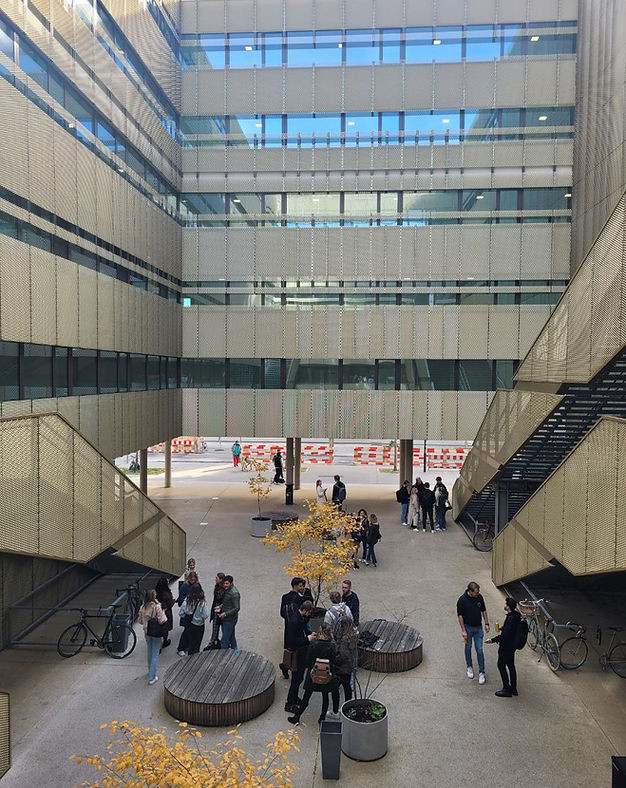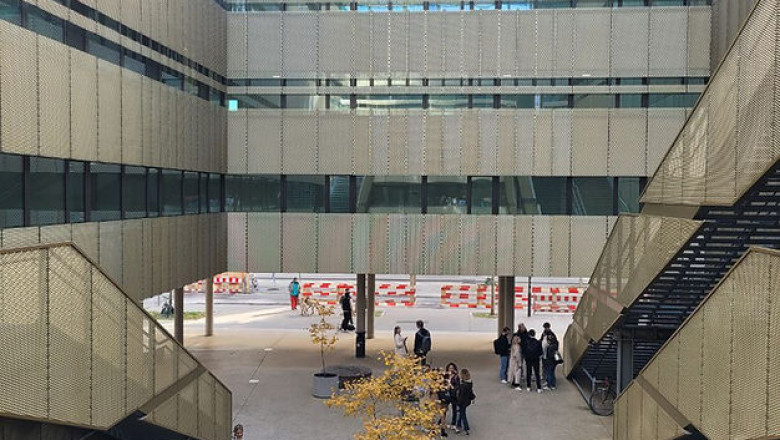views
Picture this: You've just completed your 11th grade in Ukraine, and suddenly the world of European higher education opens before you like a beautifully illustrated book. Austria, with its rich academic tradition and stunning Alpine landscapes, beckons as one of the most attractive destinations for Ukrainian students seeking quality education abroad. But here's the remarkable part – studying in Austria after completing your 11th grade isn't just a distant dream; it's an achievable reality that thousands of Ukrainian students are already living.
The journey from a Ukrainian classroom to an Austrian lecture hall might seem like crossing a vast mountain range, but with the right guidance, it becomes as navigable as following a well-marked hiking trail. This comprehensive guide will illuminate every step of your path to Austrian higher education, transforming what might feel overwhelming into an exciting adventure toward your academic future.
Understanding the Austrian Higher Education Landscape
Austria's educational system stands like a majestic cathedral with multiple entrances, each leading to different but equally valuable destinations. The Austrian higher education framework offers three distinct pathways that cater to various academic aspirations and career goals.
Universities (Universitäten) represent the traditional academic route, much like following in the footsteps of great thinkers who once walked the halls of institutions like the University of Vienna, founded in 1365. These comprehensive universities offer a broad spectrum of subjects from humanities to natural sciences, providing deep theoretical knowledge and research opportunities.
Universities of Applied Sciences (Fachhochschulen) function as practical bridges between academic theory and professional practice. These institutions focus on career-oriented education, similar to how a skilled craftsperson combines theoretical knowledge with hands-on expertise. They maintain strong connections with industry partners, ensuring that students graduate with skills directly applicable to their chosen professions.
University Colleges of Teacher Education (Pädagogische Hochschulen) serve as specialized institutions for future educators, nurturing the next generation of teachers who will shape young minds across Austria and beyond.
Recent data from the Austrian Federal Ministry of Education, Science and Research reveals that over 380,000 students are currently enrolled in Austrian higher education institutions, with international students representing approximately 27% of this population. This diversity creates a vibrant, multicultural learning environment where Ukrainian students can thrive alongside peers from around the globe.
Special Opportunities for Ukrainian Students: A Lifeline in Challenging Times
The Austrian government's response to Ukrainian students' needs has been nothing short of extraordinary. The special scholarship program Ernst Mach-Ukraine supports Ukrainian students to continue their studies in Austria, providing both financial assistance and academic opportunities during these challenging times.
Financial Support That Makes Dreams Possible
The Federal Ministry of Education, Science and Research (BMBWF) is supporting Ukrainian students, graduates and researchers with a special grant. They will receive €715 per month in order to continue their studies or research work in Austria. This monthly stipend acts like a financial safety net, allowing students to focus on their studies rather than worrying about basic living expenses.
Additionally, Ukrainian students in Austria have been exempt from paying tuition fees since the summer semester of 2022. Normally, I would have had to pay €726.72 per semester, but now me and other Ukrainian students only have to pay a fee of €21.20. This dramatic reduction in costs transforms Austrian education from an expensive luxury into an accessible opportunity.
The Ripple Effect of Support
These support measures create a domino effect of positive outcomes. When financial barriers are removed, students can dedicate more time to academic excellence, participate in extracurricular activities, and build meaningful connections with their Austrian peers. This comprehensive support system has enabled hundreds of Ukrainian students to not just survive but thrive in Austrian academic environments.
Language Requirements: Your Key to Academic Success
Language proficiency serves as the master key that unlocks the doors to Austrian higher education. In order to be admitted to a degree programme, you have to prove sufficient knowledge of German. At some universities you need proficiency in German corresponding to level B2, at others corresponding to level C1 of the Common European Framework of Reference for Languages.
German Language Pathways
Think of German language acquisition as building a sturdy bridge between your Ukrainian educational foundation and your Austrian academic future. The journey typically follows this progression:
- A1-A2 Levels: Basic communication skills, like learning to navigate daily conversations
- B1-B2 Levels: Intermediate proficiency, enabling you to engage with academic content
- C1 Level: Advanced mastery, allowing for complex academic discussions and research
Many successful Ukrainian students describe their German learning journey as initially challenging but ultimately rewarding. One student from Kyiv shared: "Learning German felt like learning to think in a completely different way. But once I reached B2 level, Austrian academic life became not just manageable, but enjoyable."
English-Taught Programs: An Alternative Route
For students who prefer to study in English, Austria offers numerous English-taught programs, particularly at the master's level. These programs serve as stepping stones for students who want to begin their Austrian education while simultaneously improving their German skills.
Admission Requirements: Building Your Academic Profile
For foreign citizens (or students who are officially stateless) to be admitted as full students at an Austrian university, the following requirements must be met: The student must have a place to study their chosen subject at the university concerned. The applicant must hold a school-leaving certificate equivalent to that issued to Austrian school-leavers.
Document Preparation: Your Academic Passport
The application process for Austrian universities requires the following documents: Proof of identification with an identity card or a passport and copies of them. Passport size photographs. High school diploma from your country of origin or equivalent. Transcript of records with the grades.
Your Ukrainian secondary education certificate serves as the foundation of your application. However, this document must undergo a process called "recognition" or "equivalence assessment," similar to translating a beautiful poem from one language to another while preserving its essential meaning and value.
Academic Transcript Translation and Apostille
Your academic documents need to be professionally translated into German and authenticated with an apostille stamp. This process ensures that Austrian universities can accurately evaluate your academic achievements and determine your eligibility for admission.
Timing Your Application: The Rhythm of Austrian Academia
In general, students in a bachelor or diploma programme have to register by September 5th (for the winter semester) or February 5th (for the summer semester). The registration period starts on April 15th. These deadlines are as fixed as the changing seasons – missing them means waiting for the next application cycle.
Visa Requirements: Your Legal Gateway to Austria
You have to apply for a student visa in person at the Austrian representative authority (embassy, consulate-general) before traveling to Austria. The visa application process serves as your official introduction to Austrian bureaucracy – thorough, systematic, and ultimately fair.
Student Visa Categories
Yes, if you are planning to pursue higher education or study for more than 90 days, you need to apply for a long-term student visa type D. For short-term courses (up to 3 months), it is possible to apply for a type C visa.
The Type D visa functions like a long-term residence permit, allowing you to live and study in Austria for the duration of your academic program. This visa also permits part-time work, enabling students to gain valuable professional experience while studying.
Visa Application Timeline
The visa application process typically takes 4-8 weeks, though during peak seasons it may extend longer. Smart students begin this process immediately after receiving their university acceptance letter, treating visa acquisition as a critical component of their study abroad preparation.
Living in Austria: Beyond the Classroom Experience
Austria offers Ukrainian students a unique blend of historical richness and modern convenience. The country's central location in Europe makes it an ideal base for exploring neighboring countries, while its high quality of life ensures a comfortable and safe environment for international students.
Cost of Living Realities
Monthly living expenses for students typically range from €800-1,200, depending on the city and lifestyle choices. Vienna, being the capital, tends to be more expensive than smaller university towns like Graz or Innsbruck. However, the Ernst Mach scholarship for Ukrainian students significantly offsets these costs.
Cultural Integration and Support Networks
Austrian universities maintain robust international student services, offering orientation programs, mentorship opportunities, and cultural integration activities. Many Ukrainian students report forming lasting friendships with both Austrian and international peers, creating a global network that extends far beyond their university years.
Student Housing Options
Student housing in Austria ranges from university dormitories to private apartments and shared housing arrangements. Student dormitories (Studentenwohnheime) offer the most affordable option, typically costing €200-400 per month, while providing opportunities to connect with fellow students from around the world.
Career Prospects: Your Austrian Degree's Global Value
An Austrian degree carries significant weight in the global job market, opening doors to opportunities across Europe and beyond. Austrian universities maintain strong connections with major international corporations, research institutions, and government organizations.
Post-Graduation Work Opportunities
Upon graduation, international students can apply for a "Red-White-Red Card," which allows them to seek employment in Austria. This pathway to potential permanent residency makes Austrian education not just an academic investment, but potentially a life-changing opportunity.
Industry Connections and Internships
Austrian universities excel at connecting students with industry partners through internship programs, research collaborations, and career fairs. These connections often translate into job opportunities, with many Ukrainian graduates finding employment with Austrian companies or using their Austrian education as a springboard to international careers.
Taking the First Steps: Your Action Plan
Your journey to Austrian higher education begins with a single step, but that step must be taken with purpose and preparation. Start by researching specific programs that align with your career goals and interests. Visit university websites, attend virtual information sessions, and connect with current Ukrainian students in Austria through social media groups and forums.
Create a timeline that includes language learning, document preparation, application deadlines, and visa processing times. Treat each component as a crucial piece of a larger puzzle – when all pieces fit together correctly, they create a complete picture of your successful transition to Austrian student life.
The path from Ukrainian 11th grade to Austrian university may seem long and complex, but thousands of students have successfully navigated this journey before you. With proper preparation, adequate support, and unwavering determination, your Austrian education adventure awaits. The Alps may be high, but with the right guide and sufficient preparation, even the highest peaks become conquerable. Visit us today https://www.globus-osvita.com/
Your Austrian education journey represents more than just acquiring a degree – it's about joining a community of scholars, experiencing a new culture, and building a foundation for a truly international career. The doors to Austrian higher education are open; all that remains is for you to walk through them with confidence and purpose.















Comments
0 comment